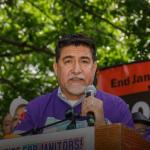ICE Tried To Make an Example out of Labor Leader David Huerta. Now Is the Time for Unions To Speak Up on Behalf of Immigrant Workers.

David Huerta, president of the Service Employees International Union (SEIU)–United Service Workers West (USWW), was detained earlier this month for doing what every labor leader should be doing right now: showing up.
Huerta was arrested this month in Los Angeles while protesting citywide raids carried out by Immigration and Customs Enforcement (ICE), exercising his right to speak out—something the labor movement has done for centuries. But because this was an immigration protest, and because Huerta is a bold, unapologetic advocate for immigrant workers, he was targeted and thrown to the ground in broad daylight.
As the executive director of the Committee of Interns and Residents (CIR), the nation’s largest physicians’ union and an affiliate of SEIU, I was shaken by Huerta’s arrest, but I wasn’t surprised. Many of our members are also immigrant workers. They are young doctors serving in public hospitals across the country, often with tenuous visa statuses, working long hours in chronically understaffed conditions. Like the janitors Huerta has spent his life organizing, these physicians hold up institutions that would collapse without their labor. And like so many others across industries, they’re expected to stay silent, grateful, and invisible.
Huerta has always refused that expectation. He’s not just the president of USWW; he’s the heart of SEIU’s Latino caucus and a respected member in our union. We call him our anchor because he’s mentored generations of immigrant worker leaders. He’s carried the legacy of the Justice for Janitors campaign with purpose and humility. He’s challenged every administration—Republican or Democrat—on immigration and labor protections. And he’s never let us forget that immigrant justice is worker justice.
That’s why this arrest wasn’t just an overreach; it’s part of a broader pattern. Across the country, immigrant workers are being met with surveillance, police repression, and political scapegoating. In Georgia, ICE arrested poultry workers during workplace raids, raising fears and chilling future organizing. In Florida, Gov. Ron DeSantis’ anti-immigrant law SB 1718 pushes workers into the shadows, making their jobs more dangerous by deterring them from reporting wage theft and unsafe conditions. In New York, law enforcement has targeted delivery workers organizing for fair pay with questionable traffic enforcement and thousands of citations.
We see the same suppression across the U.S. Noncitizen resident physicians, many of them union members, are told by employers not to demand better staffing or speak out. When they do, they face retaliation and intimidation. Whether in scrubs or hard hats, immigrant workers are sent the same message: Stay quiet, don’t organize, don’t resist.
Huerta’s detainment is an effort by ICE to send the same message. Because when someone like Huerta dares to bear public witness, it doesn’t just threaten one protest—it threatens the entire system built on fear and exploitation.
Huerta is home now. But the fact that ICE would publicly detain someone with his visibility and institutional support simply for protesting should serve as the ultimate warning for anyone who believes in worker power.
Because if they can come for David Huerta, they will come for us.
Susan Naranjo is the first Latina Executive Director of CIR-SEIU, bringing over 15 years of organizing experience to the fight for justice in healthcare and labor. As a first-generation American, Susan was raised in San Ysidro, California, by immigrant parents who later became U.S. citizens. She has dedicated her career to amplifying the voices of workers, regardless of immigration status.
When Prism was established in 2019, it was because we knew that the status quo media landscape wasn’t reflecting enough of the truth—and it wasn’t bringing us closer to our vision of collective liberation and justice. We saw a different path forward, one that we could forge by disrupting and dismantling toxic narratives, uncovering the hard truths of injustice alongside the people experiencing the acute impacts of injustice, and providing a platform for people of color to tell their own stories, and those of their communities.
